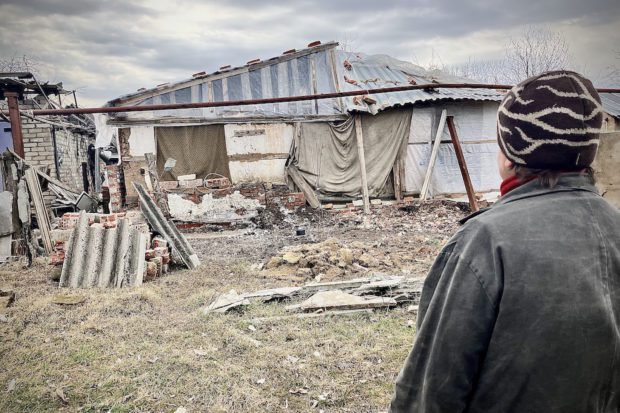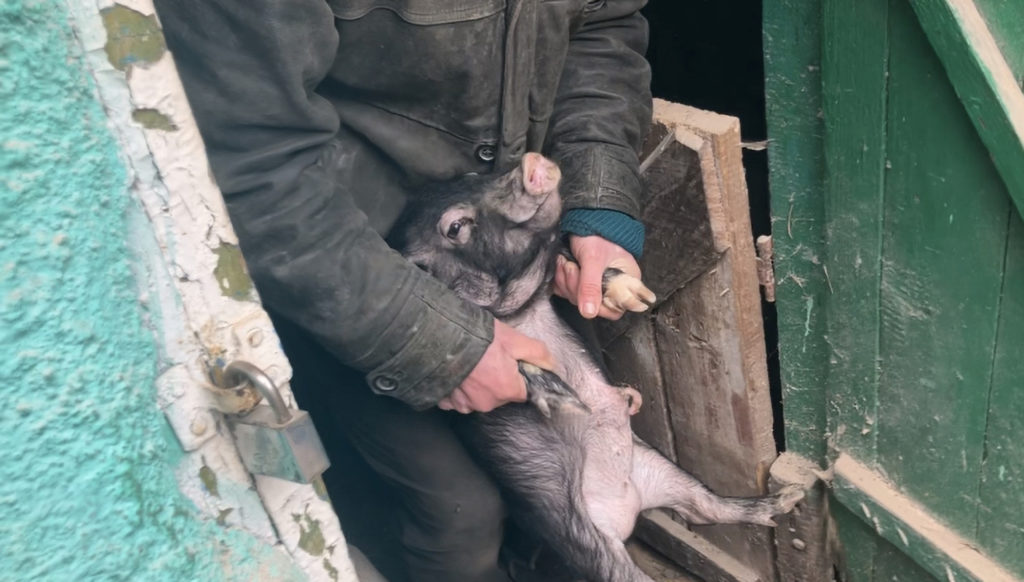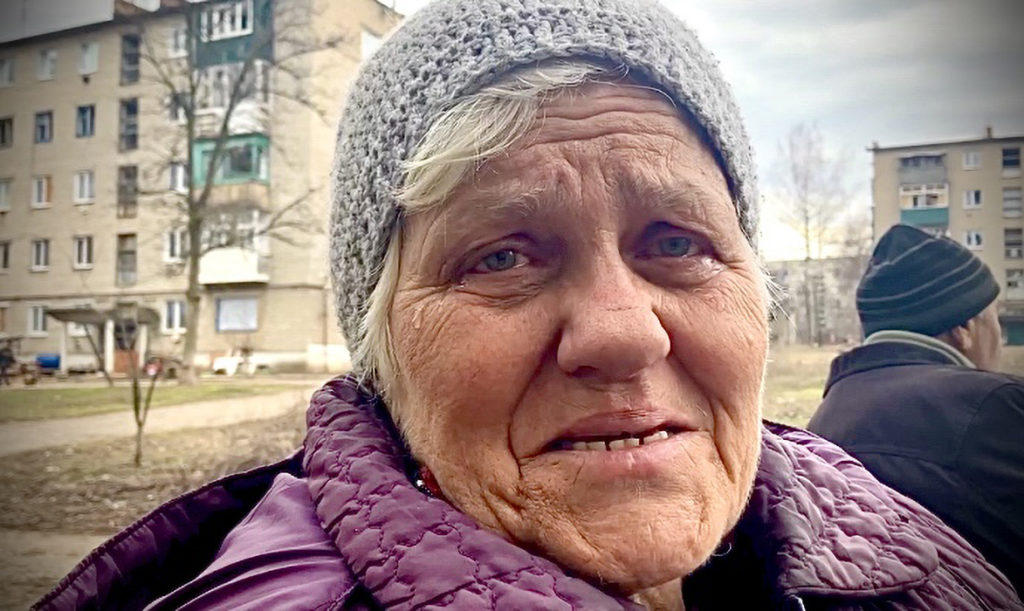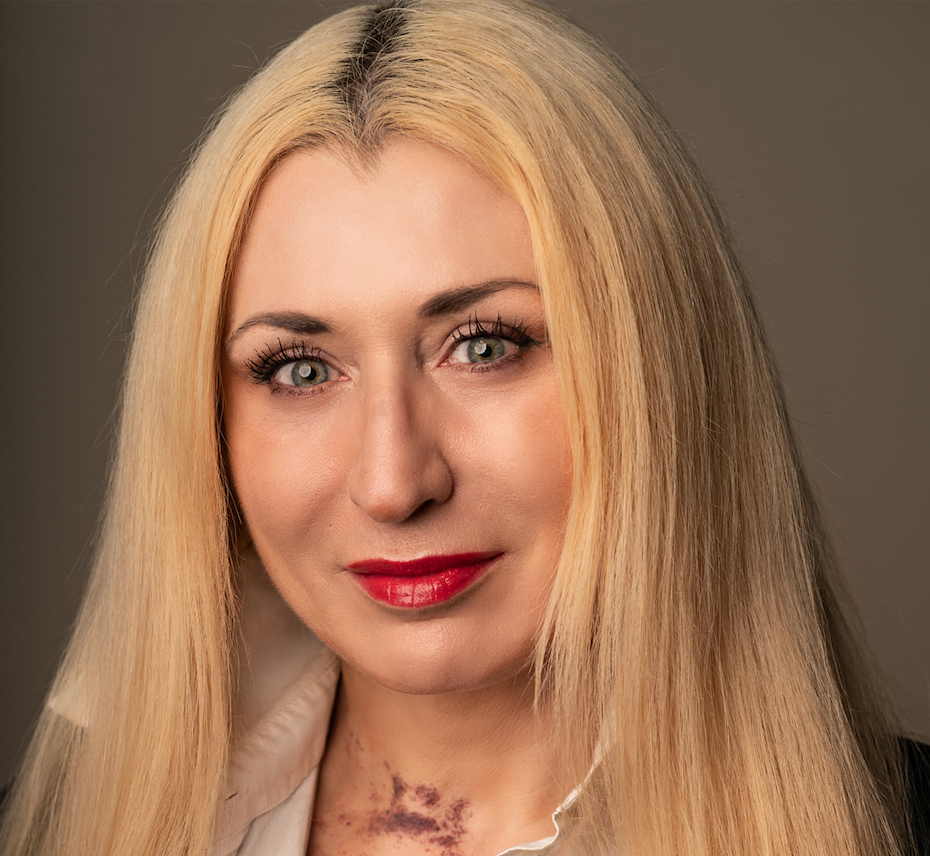
When Galyna was in her 20s, she, with her husband and friends, liked to plant trees in their beloved town of Siversk. Chestnuts, apricots, cherries and acacias grew in her yard and along the quiet streets.
“Siversk used to be a pretty town before the war,” says Galyna, sitting on a broken bench by her destroyed building, speaking through the noise. The non-stop siren of an air raid, the thunder of non-stop artillery fire and explosions mix with the thud of axes chopping wood.
Several men nearby make splinters and firewood from the trees Galyna planted in the 1970s. Two small dogs are playing by her feet, and she pats them as she speaks. “We must cut the trees down to burn our wood stoves, to heat the basement and cook food. My heart is crying. It hurts.”
Nothing in Siversk resembles the pretty town of Galyna’s memory. Not a single building is intact. Glass shards, broken cement and torn wires cover the ground with a nightmarish gray carpet screeching under one’s feet. No glass on the windows anywhere—it does not matter as people have lived in the basement for a year now, hiding from the death coming from the skies. Even then, getting food or water brought by volunteers from nearby Kramatorsk, many are killed and injured.
Eleven people live in the basement of Galyna’s building. No children are left on their block. Swings at the playground in the yard serve as a clothes rack. The administration provides technical water in large tanks. A well with drinking water is a 20-minute walk down the hill, but it is dangerous. Russian troops are showering Siversk with cluster bombs and missiles.
Every day, volunteers bring water in an old ambulance vehicle, and locals line up with large canisters and plastic bottles. Greg and Ben, American and British volunteers, bring water to Siversk in the old ambulance, driving it via a broken road from Kramatorsk twice daily.

Iranian-made Russian drones cruise over the road and attack convoys often. As we follow the ambulance across the bridge, our car goes under fire. Working is only possible with bulletproof vests and helmets due to constant shelling.
“We deliver water as all human beings have the right to fresh water,” explains Ben. “We have measured water quality in the river and the wells, and it is beyond the standard. Drinking this water will lead to irreversible health damage.
“We found a local person in Kramatorsk to filter the water. First, we just paid all the expenses ourselves, but soon we ran out of funds, so we did crowdfunding.”
Problems with drinking water are common in war-torn Ukraine because the Russian military targets the pipelines and critical infrastructure. Mykolaiv, a large seaport by the Black Sea, lived without drinking water for nine months as the Russian troops destroyed the water access at the beginning of the full-scale invasion in March 2022.
Currently, most towns and villages in Donbas live with little to no water, power, heat and communication, relying on volunteers like Greg and Ben for food supply. All enterprises are destroyed, and there are no jobs.
Leaving is hard not only due to the bonds with the land, animals and memories. There is simply no money to relocate. For the elderly, leaving is unthinkable. Life in basements becomes a habit.
Women use the water Ben and Greg deliver to cook breakfast porridge and soup for lunch. Dinner is whatever is left from the two previous meals, with bread, delivered weekly by the city administration. People keep busy with daily chores and risk getting outside for some air as spring arrives in Donbas.
“After breakfast today, we went out to clean up our yards, a spring cleaning,” explains Galyna. “We found the first flowers sprouting from the ground. That gave us hope: We will live. Ukraine will survive.
“You know, my son is not in Siversk anymore; he drives postal packages around Ukraine. Sometimes, my husband and I climb to the top floor of the destroyed college across the street and try to get the Internet connection to call him to tell him we are okay. Last time we lucked out, he told me, ‘Mom, I drive everywhere, and I wish you could only see how beautiful our country is, east to west. Everything is blossoming.’”

As Ben and Greg stop at another destroyed, empty street, people climb out of the basement to line up for water. Vera and Boris, a couple in their late 60s, wait with two large canisters in a line, their dog sitting next to them. Their house was hit on July 18, at 12:30 a.m., as they were asleep.
Cluster munitions destroyed a significant part of the house, the living room and the kitchen, but their bedroom, even though damaged, did not collapse entirely. Vera and Boris got only light injuries.
Since then, they have lived in an unheated basement, without power, gas, water and communication, just like the rest of the Siversk population. They have a small generator, listen to the radio in the morning and evening to catch up with the news, and read books to each other. Three cats and two dogs keep them company.
Their children and grandchildren live in Kyiv, the capital of Ukraine, and they have not seen them for a year, as it is too dangerous to visit Siversk.
“We lived well before,” said Boris, speaking Russian. “Nobody here is rich, but we had our houses, our farms, we had a cow and a few pigs. We had peace; we used to have fun gatherings. Some speak Russian, some speak Ukrainian, and some speak a dialect called Surzhik. None of it was ever a problem until this horror started.”
“We have 20 family graves here to care for,” says his wife, speaking Ukrainian. “Why should we leave? This is our land. We were born and raised here, and we will die here.”
Dying in Siversk is easy. We see fresh graves in the hospital’s yard as we drive through the apocalyptic landscape, as the wind whistles through the empty door frames and windows and the thumps of artillery fire get louder.
“A cluster bomb injured me and killed two young men as we were lining up here last year,” says Sergey, another resident waiting for water. “I could not walk for three months, but it is unbearable to think these young men’s lives were cut short—for what?”
Sergey does not want to leave as he has a small farm: a dozen Vietnamese piglets and their mother, several dogs and cats and chickens. Since childhood, he has adored animals. Sergey suffers from Parkinson’s disease, and caring for his animals is hard, especially as he cannot get the medicine he needs—all pharmacies in Siversk closed long ago. Only two small shops are open several hours a day. Ben takes his number to try to help.
“These animals are like my children,” he says as another explosion nearby rocks the ground. “I cannot take them with me. If we go, who is going to take care of them? Who needs them? I can’t leave.”
Yet, as the front line gets closer to Siversk, many residents might face the need to move soon. As we worked at a rescue-and-evacuation center in Kramatorsk, we interviewed many families who were reluctant to leave nearby Bakhmut until the last minute.
They had to be evacuated from their town after Russian shells destroyed their houses and the streets burned down. Volunteers like Ben and Greg from around the world risk their lives to save them.
Maryna, a math teacher with 30 years of experience, said she and her husband stayed until the last minute in Bakhmut and now had nothing left besides his wheelchair and their passports. The people of Siversk are aware of the threat and hear the stories from Bakhmut but do not give up hope.
“We might not have much,” said Galyna back in her dark, cold basement in Siversk. “Yet, we will plant new trees after the war. We will keep our heads high, feel better and find beauty in our city and our hearts. We will leave our beautiful trees for a new generation, for our kids and grandkids.”

